Suchergebnisse für "Factsheet: Energietechnologien gestalten, die für alle sinnvoll und nutzbar sind"
Zertifizierung von Siedlungen / Quartieren
Sondierungsprojekt zur Übertragbarkeit des Schweizer Systems der 2000-Watt Arealbewertung auf Österreich
OPEN HEAT GRID - Offene Wärmenetze in urbanen Hybridsystemen
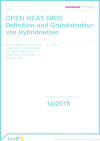
Primäres Forschungsthema von OPEN HEAT GRID war die Untersuchung der Möglichkeiten zur Forcierung der Einspeisung industrieller Abwärme in bestehende Fernwärmenetze.
Schriftenreihe
1/2018
Herausgeber: BMVIT
Deutsch
Downloads zur Publikation
Low Tech – High Effect! Eine Übersicht über nachhaltige Low Tech Gebäude
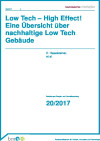
In dieser Studie wurden Ansätze von Low Tech Gebäuden näher betrachtet und besonders innovativ und repräsentativ erscheinende Konzepte detailliert dokumentiert. Ziel war es, den derzeitigen Stand der Technik und das vorhandene Know-how und Wissen anhand realisierter Beispiele aufzuarbeiten sowie Potenziale zur Weiterentwicklung aufzuzeigen.
Schriftenreihe
20/2017
Edeltraud Haselsteiner, Andrea Bodvay, Susanne Gosztonyi, Anita Preisler, Michael Berger, Bernhard Gasser
Herausgeber: BMVIT
Deutsch, 192 Seiten
Downloads zur Publikation
Evaluierung Visionärer Architekturkonzepte
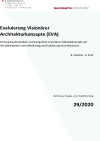
Prüfung bauphysikalisch und energetisch innovativer Gebäudekonzepte auf ihre Machbarkeit unter Monitoring und Evaluierung eines Mock-Ups.
Schriftenreihe
29/2020
B. Sommer, U. Pont, et al.
Herausgeber: BMK
Deutsch, 71 Seiten
Downloads zur Publikation
Optimierung der SOLARenergienutzung in URbanen Energiesystemen (URSOLAR)
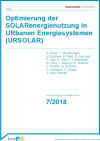
URSOLAR stellt EntscheidungsträgerInnen eine Roadmap zur integrierten urbanen Solarenergie-nutzung zur Verfügung. Es wird aufgezeigt, wie Photovoltaik (PV) und Solarthermie angepasst an infrastrukturelle und rechtliche Gegebenheiten in idealtypischen Stadtquartieren aus ökonomischer, ökologischer und sozialer Sicht sowie unter Berücksichtig von Stakeholder-Interessen optimal ge-nutzt werden können.
Schriftenreihe
7/2018
A. Posch, T. Brudermann, M. Buchner, E. Fleiß, D. Geringer, P. Hart, S. Hatzl, T. Kallsperger, G. Lang, T. Mayrold, E. Meißner, C. Reischl, G. Schnedl, S. Seebauer, K. Stöger, A. Würz-Stalder
Herausgeber: BMVIT
Deutsch, 137 Seiten
Downloads zur Publikation
MARGRET - Measurement of greened/non-greened objects for the adaptation of calculation models
Development of measurement methods to determine the influence of greening measures on greened versus non-greened reference objects with contemporary building standards under uniform framework conditions. Proposals for adaptations of calculation models or standards to e.g. enable an integration in the energy performance certificate.
LehmKur - Rammed earth walls for multi-storey residential buildings
Research of a lighthouse project consisting of rammed earth-timber exterior wall components with accompanying ecological life cycle analysis, building physics simulations and documentation of the necessary logistical, building law, fire and soundproofing measures.
Machbarkeitsanalyse zertifizierte Plus-Energie-Quartier-Sanierung des denkmalgeschützten Otto-Wagner-Areals (OttoWagner-ArealPlus)
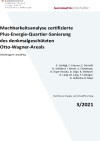
Entwicklung eines innovativen denkmalschutzverträglichen Sanierungskonzepts zur Transformation des Wiener Otto Wagner-Areals in ein Plus-Energie-Quartier. Das Jugendstil-Juwel umfasst eine Fläche von rund 50 Hektar, 70 Gebäude und eine Brutto-Grundfläche von rund 200.000 m². Der Lösungsansatz umfasst dabei höchste Energieeffizienz- und Komfortanforderungen.
Schriftenreihe
3/2021
K. Schlögl, C. Kresser, E. Schriefl, H. Schöberl, I. Artner, S. Chatterjee, D. Ürge-Vorsatz, D. Ürge, K. Stieldorf, F. Gharakhanzadeh, I. Stieldorf, G. Lang, M. Lang, T. Lebinger, G. Jedliczka, B. Mayr
Herausgeber: BMK
Deutsch, 162 Seiten
Downloads zur Publikation
Langzeitevaluierung des Energieverbrauchs von 100 energieeffizienten Gebäuden in Österreich als repräsentativer Querschnitt österreichischer Leuchtturmobjekte (LZE 100 Leuchtturmobjekte)
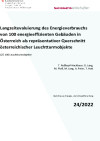
Erfassung, Auswertung und Analyse von Energieverbrauchsdaten von 100 energieeffizienten Gebäuden in Österreich über eine Betriebszeit von 3 bis 25 Jahren als repräsentativer Querschnitt der österreichischen Leuchtturmobjekte. Differenzierung nach Gebäudetypen, Energieträger und Ermittlung der realen Treibhausgas-Emissionen. Vergleich der gemessenen Verbräuche zu Benchmark-Werten.
Schriftenreihe
24/2022
T. Roßkopf-Nachbaur, G. Lang, M. Ploß, M. Lang, A. Peter, T. Hatt
Herausgeber: BMK
Deutsch, 143 Seiten
Downloads zur Publikation
PersonAI - User-Centered AI-based energy services built on personal preference models
Conduct a large-scale, long-term study with 40-50 people to create personal comfort profiles to increase comfort in buildings. The personal comfort profiles will then be fed back into the building control system as input variables in a proof-of-concept.
#EEG++ Digital Energy Communities Optimized
The project aims to develop an innovative energy system for plus-energy neighborhoods by integrating advanced photovoltaic installations, IoT technology, and energy communities to maximize the self-consumption of renewable energy while ensuring economic efficiency and user-centricity.
DREI x NULL = NULL - Research project on climate-neutral construction in all life cycle phases based on three demonstration buildings
The aim of the F&E project is the realization of three different residential buildings, which are all climate-neutral in the life cycle phases of construction, operation and dismantling. The aim is to create exemplary showcase projects for the future residential construction sector.
AI4FM - Artificial Intelligence for Facility Management
AI-based anomaly and fault detection in buildings. Digital twins of buildings with simulation models for testing and optimizing rule-based fault detection methods. Mining of the recorded time-series data from existing Building Management Systems to train Machine Learning models for fault detection.
ReBuildStock - Portfolio management for the decarbonisation of larger housing stocks
Portfolio management method to support the decision-making processes of owners of larger housing stocks in developing strategies for the rapid and socially responsible decarbonisation of their building stock.
GeoDatKlim - Geo Data and Satellite Data for Carbon Neutral Cities
The GeoDatKlim (Geospatial Data for Climate Neutral Cities) innovation lab will help optimize the application of geospatial and satellite data to solve complex urban challenges. The innovation lab serves as a networking platform for administration, science, economy, as well as a development and test environment for innovative use cases.
MasSan - Feasibility study of serial renovation concepts & models in Austria
Feasibility study to present and analyze the framework conditions and potential of serial renovations of large-volume buildings. The findings from the national pilot projects as well as the international / German projects and models are extracted and checked for their feasibility in the Austrian context and the requirements are prepared.
Earthen building 2.0: Earthen building of the future - The art of craftsmanship based on engineering approaches
The exploratory project investigates the suitability of fiber optic sensors for the long-term monitoring of the deformation behavior of rammed earth wall elements under moisture and temperature fluctuations (shrinkage) as well as loads (creep). The experimental findings will be integrated into a finite element model to simulate failure behavior under load.
E_PROFIL - neighborhood profiles for optimized energy transformation processes
E_PROFIL is a set of methods (an IT-supported toolkit) for the elaboration of neighbourhood profiles. The aim of the project is to facilitate an energy and resource efficient development in the planning practice of Austrian cities. Furthermore, the project is an important asset for research and planning activities in Europe and can also be applied to other neighbourhoods.
InSite - Monitoring and evaluation of innovative demonstration buildings
In the "Stadt der Zukunft" and "Smart City Initiative" programmes, a large number of demonstration projects have been implemented in recent years. To be able to evaluate the developed innovations in a uniform and comparable form and to make the knowledge gained accessible to implementers, InSite subjects 10 selected objects from these programmes to energy and ecological monitoring as well as sociological surveys over a period of 24 months. The interpreted results are publicly available as a published study and as an interactive online platform.
PEQBacker: Integrated District Planning - Enabler on the way to a Plus-Energy District
Development of guidelines for the implementation of Plus-Energy District coordination units based on research of success factors, exploration of mission elements of existing structures and consultation of a broad stakeholder group with the goal of increasing the transformation of existing and emerging neighbourhoods toward Plus-Energy Districts.
